I Keep Falling in Love with Things I Don't Want to Own
What I learned about happiness and capitalism by falling in love with things I refuse to buy
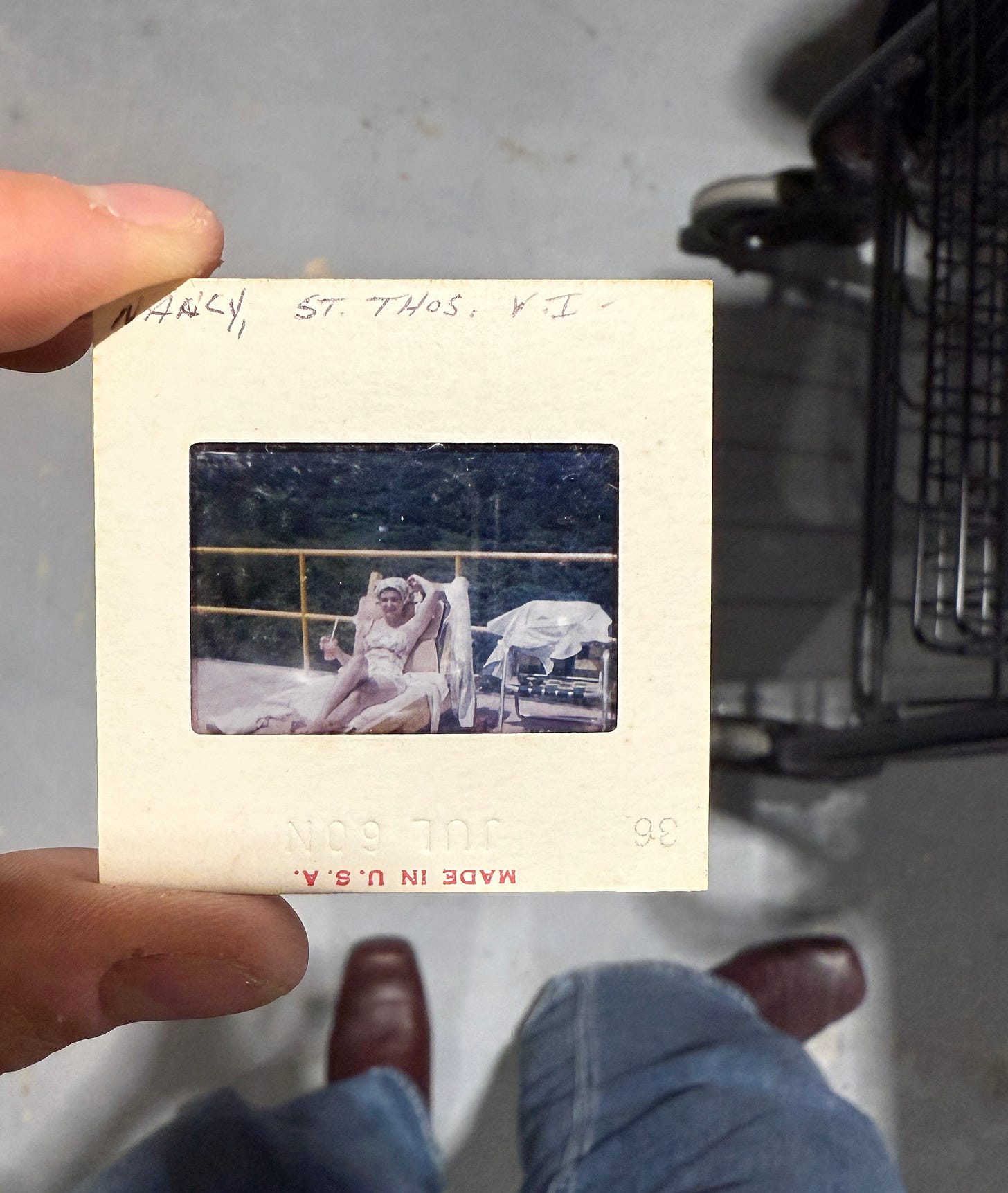
I can't stop thinking about these fucking slides.
It's 5:20 AM and I'm going through my phone looking at pictures I took of other people's pictures. Zero has been sick all night and my mind is racing. Yesterday I saw Jurassic Park which made me feel nostalgic and scientific and transported to another time.
Then a few things popped into my head.
Should I write a newsletter. The happiness course I finally finished after five years. The prints.
The Kodak prints were so interesting.
Do I sound obsessed? I probably sound obsessed. But Zero is sleeping beside me so I know he's at least happy and not sick and that makes me happy.
Yesterday afternoon I found them at the reuse store. That place smells bright and clean, like they actually care about everything in there. THEY DO. There have been multiple times I've picked something up and someone runs up to me and says I HAVE A WHOLE COLLECTION IN THE BACK. And I'm just like YESSSSS bring it. My stomach is tight. I need to know more.
But I'm also ok with not knowing anything else.
Which makes no sense but here we are.
Kodak slide sleeves, the ones I've seen in movies. That classic yellow and red branding. I wish my family had old Kodak prints so I could see my own history played out. But I don't think we do. My brain immediately starts running. Who were these people? What year? Why slides and not prints?
I hold them up to the fluorescent lights and my body does this thing. This little flutter when the beauty hits. They felt so light. The stack was messy and just thrown in the box, not even in their case. I wanted to capture them without my finger in the snapshot, but it was hard to find a surface that didn't cast a reflection, and maybe now that's part of the story anyway.
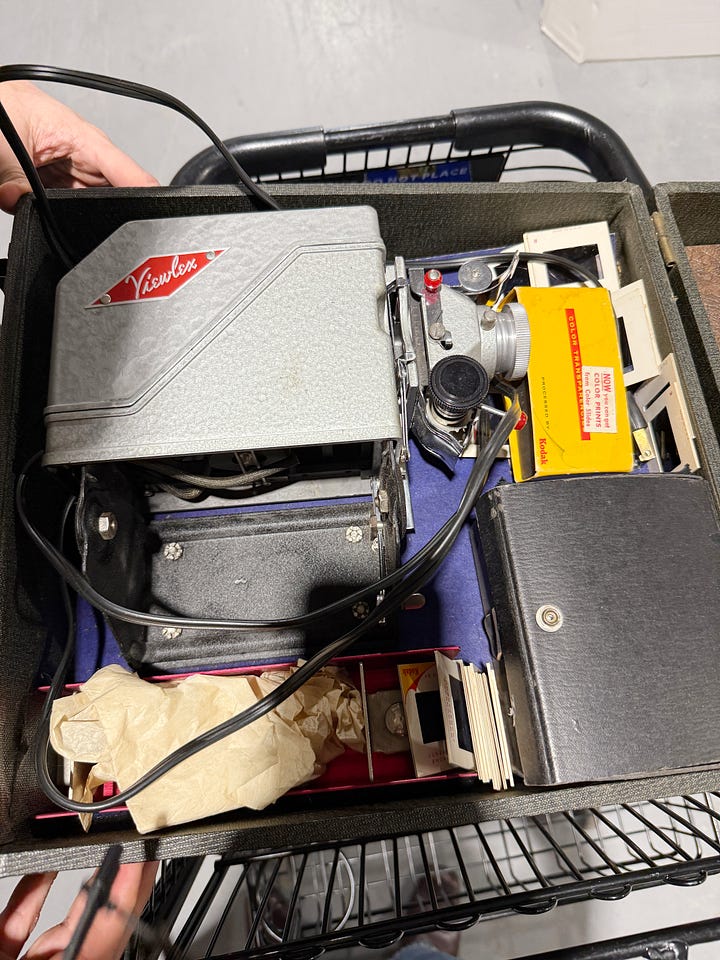
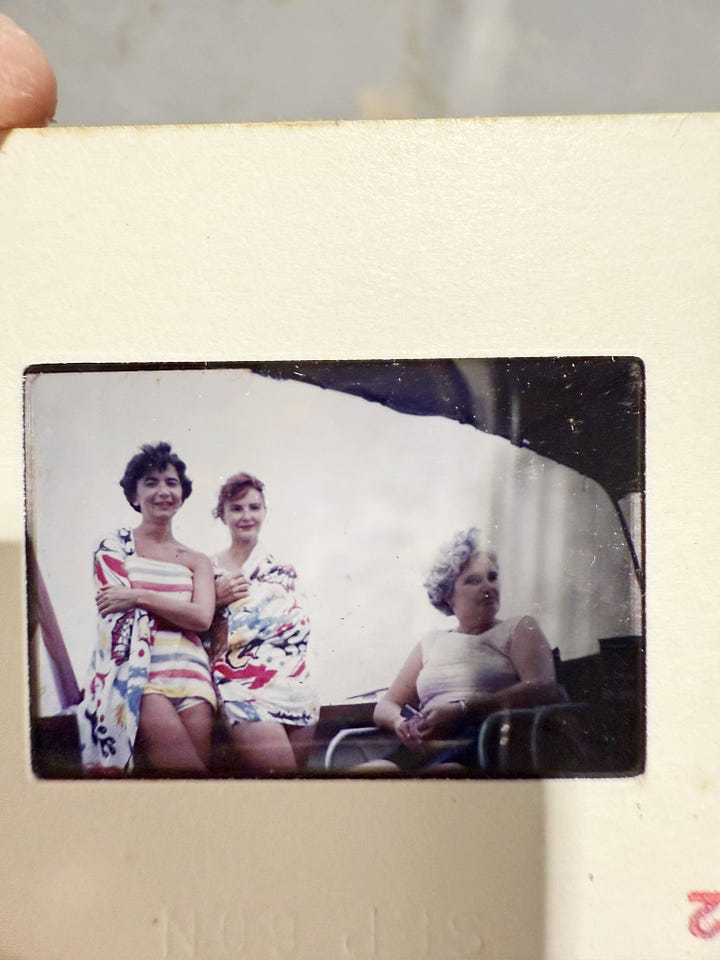

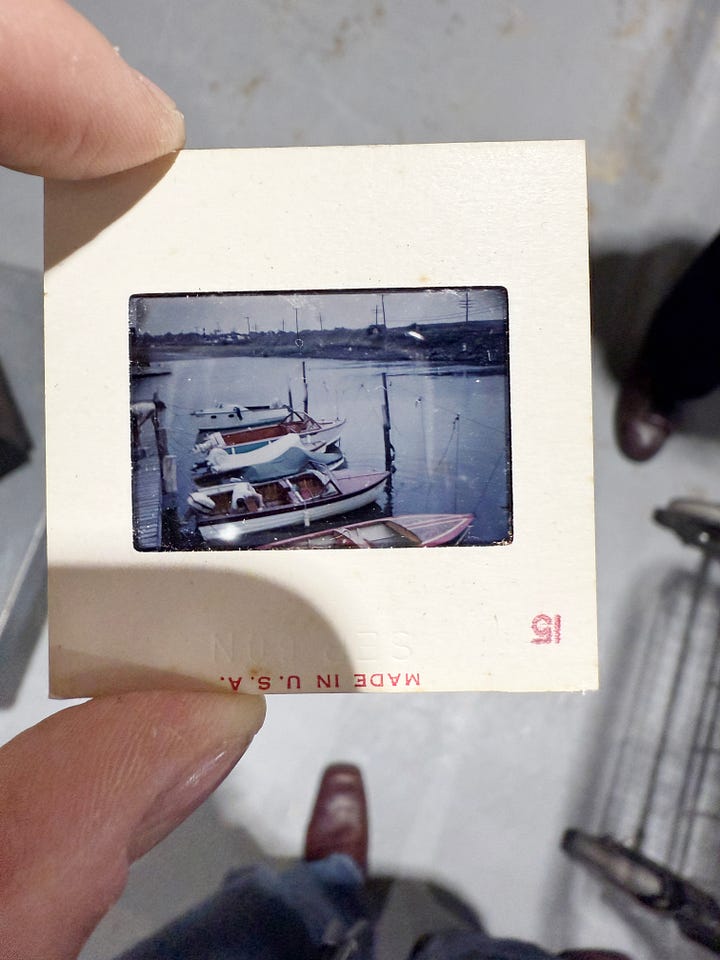
Wooden boats, blue water and smiles and odd glances from behind. The candid photos you could only take back then with film. Two women sitting on a dock, their laughter frozen. A man's hands guiding a sail while his eyes look somewhere beyond the frame. Kodachrome slides - that was expensive film. These weren't snapshots. These were precious shots, worth the extra money.
These aren't tourist snapshots.
My brain starts building the story immediately. I can't help this. It just happens. They look like sisters, she kind of looks like my grandma. She was thirty-two and this was her first vacation in five years because she'd been saving money to leave her marriage.
No, wait. She was celebrating a promotion.
No. She was saying goodbye to her sister who was moving to California.
Am I making up entire lives for people in vacation photos? Yes. But my stomach doesn't care about logic. It cares about story.
These are the photos you could only get with film. Real expressions. Real moments. No posing for twelve different angles. Some are mistakes, bad angles, and that's the point. You never knew what you'd get until you developed them.
In my head, they saved for three years for this trip. They researched every restaurant, every beach, every sunset spot. The man with the hands brought his camera because he knew this week would need to last them forever.
Someone spent money to develop these. To preserve these moments. To keep them safe in those little cardboard mounts. And now they're here, in a charity shop, and my shoulders are creeping up the way they do when I want something I shouldn't want.
I held these photos in my hands, flipping through someone else's memories. My chest getting tight because I want them. The story is strong enough that it pulls me to keep them. So I can relive it. It's inspiring maybe or reminds me of what I want to be, or who knows. But I want it regardless.
I took pictures of all of them then neatly closed the case back up and put it back, hoping someone else will discover their stories.
Should I have bought them?
No. I have no use for them.
This is the part I can't explain to people. Why I don't just buy the thing I found.
My body has learned a new kind of math
I want to save them AND I want to leave them.
Both things are true and my body holds both feelings at once without trying to fix them.
Here's what my brain does now, automatically. I see something and sometimes I automatically snap a pic, look online what's it worth, and then realize that's not what I'm after anyway. We're trained to look for THE NEXT PICASSO, but that's not what this is. I want the story. I want to witness it.
But also sometimes I do want to own it.
Here's what this costs me and I never talk about this. Walking away from beauty over and over again. Training myself to love without taking. It's fucking exhausting sometimes. There's this constant low-level grief of letting go, of trusting that meaning doesn't need my protection. I second guess a lot of the things I walk away from. Some days I wonder if I'm missing out on actual joy because I'm so committed to this weird practice. Like am I just being stubborn? Is this even helpful or am I just making life harder for myself for no reason?
You can't own happiness. I keep coming back to this. It was one of the main things from the Science of Well-Being course - this idea that we're wired all wrong about what makes us happy. But I learned it from Laurie Santos and never really got it until I started practicing it with actual objects. The moment you try to capture joy, it evaporates. The second you try to possess beauty, it becomes just another object taking up space in your house, making you feel guilty for not loving it enough.
We live in a culture that teaches us to monetize everything. Turn your hobby into a side hustle. Optimize your gratitude. Make your mindfulness productive. But happiness doesn't work that way. The more you try to grab it, the more it slips through your fingers.
I've developed what I can only call an obsession, though that word feels too intense for what this actually is. It's more like a meditation. A practice that came from the Science of Well-Being but I never fully understood until I started hunting through all these things at the reuse store with no intention of buying anything.
Intention being the key word. I still want things. I just don't take them. Which feels like some kind of emotional exercise that no one asked me to do.
When I found her entire world
Three months ago, I saw something from across the floor and just beelined it. Like I was a little magnet. My body knew it was going to be good before my brain caught up.
I'm walking through the front and there is this WHOLE TABLE filled with art books. LIKE MY DREAM. Do you know how expensive art books are? It's ridiculous. And these were stunning from all over the world. Galleries, modern art, architecture. I fucking loved it. I was obsessed. JOSH GET A CART!
Real art books. Museum catalogs. Gallery books. OMG, hand written notes inside the books.
The volunteer tells me they came from Susanne Hilberry's estate. Her family donated them, they said. But my mind likes to make up stories. I imagine them going through boxes, overwhelmed by the sheer volume of a life spent looking at art.
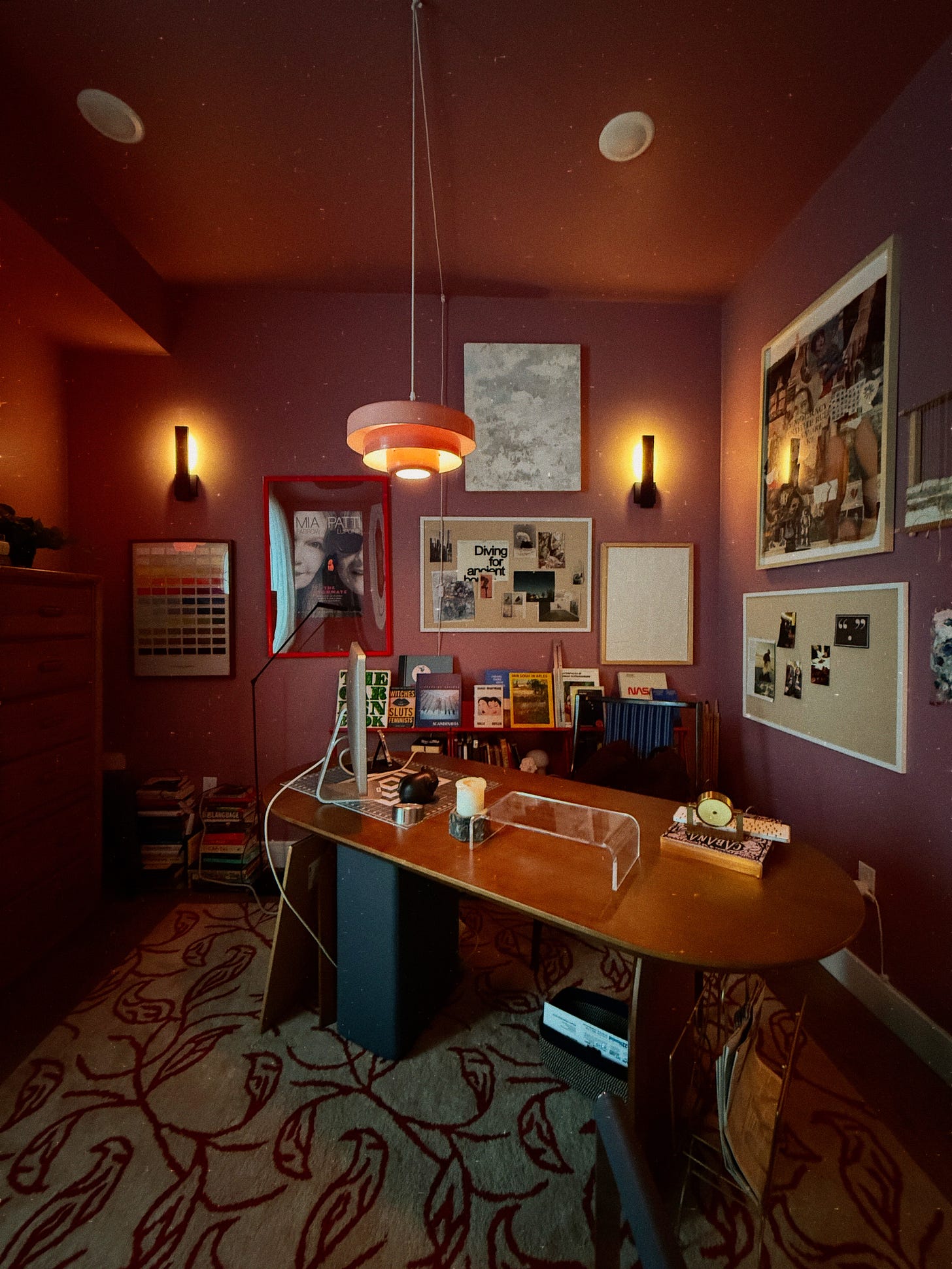
Maybe they kept a few pieces that seemed important. Maybe they just wanted these books to find someone who would love them the way she did.
Maybe that's not fair. Maybe they understood perfectly and just couldn't keep forty years worth of art books. Maybe they cried when they packed them up.
Standing there, I could feel her entire life through these books. Susanne Hilberry was a gallerist who helped shape Detroit's contemporary art scene. She was a connector, someone who brought the art world to Detroit and Detroit artists to the world.
She had this gift - spotting genius before it became obvious to everyone else. Kind of like what I do, except instead of spotting artists who would become famous, I spot stories before they disappear forever. We're both collectors of the overlooked, I guess. She collected artists. I collect moments.
It's hard to let things go sometimes. But I'm getting better at it. There's something powerful about choosing not to possess something you love. It takes a different kind of strength.
Gallery catalogs from around the world. Museum reports. Art books with her careful notes in the margins. The leftovers of a life spent seeing what others missed. Her gallery's records are now preserved in the Smithsonian Archives.
Now I have her gallery books from Japan, Berlin, her pottery collection, her display of Egyptian ashtrays. All throughout my house. I love that I have someone else's prized possessions and her travels here. It makes me feel like I'm living in my own curated museum. Like I need to add little plaques beside each piece sharing their story.
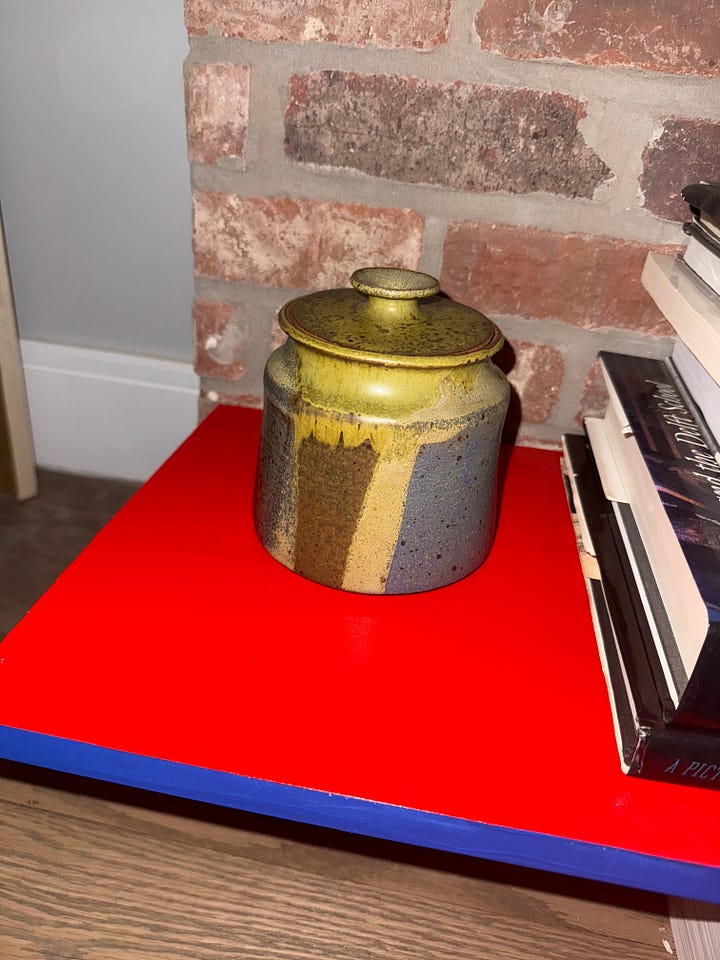
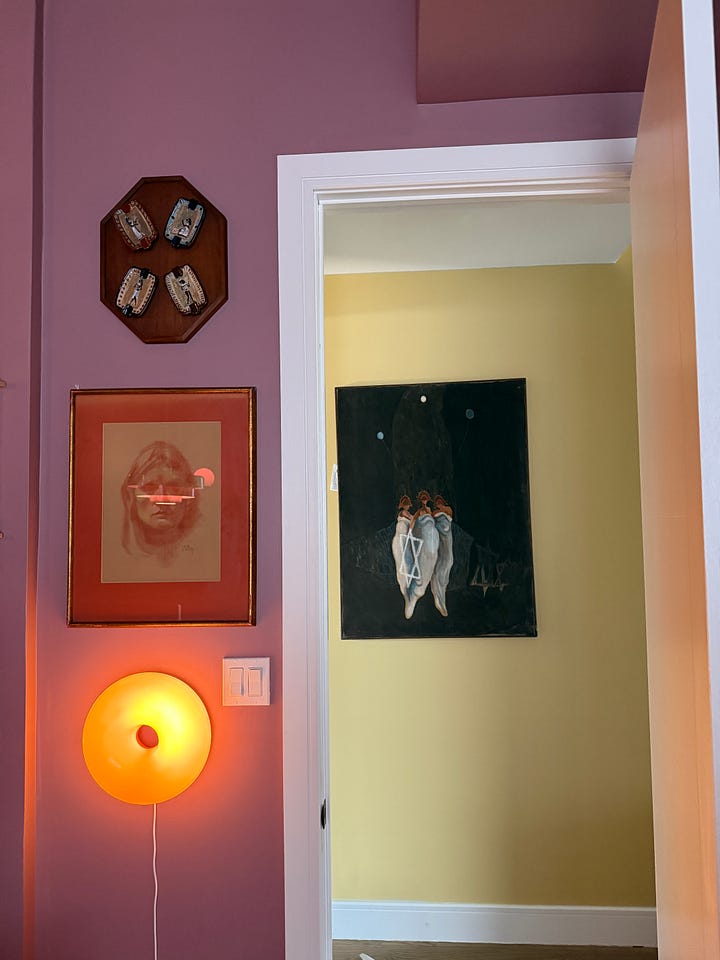
And they don't need to be famous, even though she slightly was, to have meaning. The stories are enough.
My body knew before my brain did: this was different. This wasn't just someone's old stuff. This was someone's way of thinking, preserved in notes and book-marked pages.
In my twenties, I collected things without understanding why. Convinced I was obsessed with antiques, only to bring them home and watch their magic disappear. It only works if there is a story. Imagined or real, but a story nonetheless.
I still have some of those things. Plopped around my apartment, making me feel guilty for not loving them the way I thought I would.
But these books are different. When I read her notes in the margins, I'm not just learning about art. I'm learning how her brain worked. How she saw patterns. How she spotted the thing that mattered before anyone else noticed it.
And that’s what I can’t get enough of.
How my brain builds entire worlds from single objects
Here's what really happens in my head when I find these things.
I don't just see the object. My body starts building the entire world around it. The kitchen where that cookbook lived. The woman who wrote "needs more salt" next to the lasagna recipe. I decide she was a perfectionist who tested every recipe at least three times before serving it to guests. The dinner parties she threw. The way she probably stood at the counter, tasting from a wooden spoon, adjusting until it was perfect.
The Caribbean slides aren't just images. They're invitations into someone else's world.
I decide the man with the hands was the photographer. He looks like someone who would frame a shot carefully, wait for the right light. The way the women laugh together feels like old friendship, not new romance. This was their annual trip, I decide. Two women who met in college and promised to vacation together every year, no matter what.
My brain builds entire stories around a single frame. The way the light falls across the woman's shoulder tells me it was late afternoon. The casual way she's leaning against the boat says she felt safe, loved, free. The photographer caught her in a moment of pure joy, and years later I get to witness it.
I sound like someone who collects feelings instead of objects. Which might be exactly what I'm doing.
This feels precious AND completely ordinary.
My brain has developed its own logic. It seeks out the forgotten, the overlooked, the accidentally beautiful. Not what has value, but what has story. Not what's worth money, but what's worth remembering.
I check online later (force of habit, that capitalist reflex that lives in my body whether I want it or not) and find these slides are worth nothing to the world. But my brain doesn't care about worth. It cares about the story it can build, the world it can imagine, the life it can witness without living.
This isn't collecting. This isn't even shopping. I don't know what the hell this is. Like therapy maybe?
Or some weird combination of both that I don't have a name for.
The impossible place I keep imagining
I was writing this and found an old screenshot on my phone about this Japanese word. Tsundoku. Collecting books and letting them pile up because it makes you happy. Which is maybe what I do? I don't know. I scan them mostly for old movie tickets as bookmarks or notes. Any sign someone actually lived with these books.
But we don't have a word for what I do. Collecting stories without collecting things. Building wonder without building piles.
I keep imagining this impossible place. A discovery box service where you don't get to keep anything. You open a carefully curated collection of someone else's treasures, spend time with them, learn their stories, and then pass them on.
This is probably just a museum but they don't feature the things I want to know about. Well sometimes they do. But most of the time it's paintings and OLD pottery, swords, guns. Some of it's cool but I want the weird personal stuff. The cookbook with notes in the margins. The vacation photos. The books someone actually read and marked up. The card box I found that says "Made in Maine" - one deck is Jack Daniels and the other is this floral deck. In my mind it's a couple's deck they used for years. The coffee mug with a chip that someone refused to throw away. The reading glasses left in a book as a bookmark. The things that show how people actually lived, not just what they thought was important enough to preserve.
Or maybe it's a digital archive of all the forgotten things I encounter. Not to sell them, but to preserve the moment of recognition. The spark of connection. The story my brain built around them. A museum of almost-ownership, of love without possession.
Would anyone else want this? Or is this just my weird body trying to solve a problem only I have?
Because that's what I'm really obsessed with. Not the objects themselves, but the stories they carry. The way a single photograph can contain an entire vacation. The way someone's notes can teach you how to see. The way beauty can exist without being owned, how meaning can be shared without being lost.
I want a place where you can have that moment of falling in love without the pressure to make it permanent. Where discovery itself is enough. Where the story matters more than the thing.
What this practice costs me
It took me five years to finish Laurie Santos' Science of Well-Being course. FIVE YEARS. Not because it was hard, but because the final assignment required sharing your thoughts with strangers on the internet. For five years, every time I'd log in and see that I was stuck at 97%, my chest would get tight and I'd close the laptop. The thought of someone reading my ideas and thinking they were stupid felt like drowning. So I'd put it off another week, another month, another year. My body literally couldn't handle the possibility of being judged.
Laurie Santos taught me about savoring. How to deliberately pay attention to good experiences as they happen. She's brilliant - the whole course is about how we're not wired or conditioned to seek out the things that actually make us happy, we've got it all wrong. But somehow capitalism corrupted even that, turning mindfulness into a productivity hack, gratitude into a growth strategy. Everything had to optimize something else.
I had to do the inner work first. Let go of people pleasing. Learn to value my own thoughts over everyone else's. Stop caring so much about what others thought of me. Which sounds so simple, but is just SO hard.
But like, going through all this stuff at the reuse store... I don't know. I figured out some weird new way of wanting things maybe? The kind that doesn't need to possess anything.
Except sometimes it does and that's confusing.
What my body learns from walking away
Every time I walk away from something at the reuse store, my body practices a kind of love that our culture doesn't really understand.
My shoulders want to tense up. My chest wants to get tight. My brain wants to start the familiar cycle of want-plan-acquire-possess. But I've trained my body to pause in that space between wanting and taking.
This is the hardest part to explain. People look at me like I'm broken when I say I don't want to buy the thing I just found.
Those Caribbean slides will find someone else, or they won't. Someone will discover the same magic I felt, or they'll sit in a box until they fade to nothing. Both possibilities are perfect, and my body has learned to find peace in this uncertainty.
Most of the time.
I left them there not because I didn't want them. Part of me did, desperately. The same part that makes me check resale values, that whispers about preservation and purpose. The part that says "but what if no one else sees how special they are?"
But I've learned to tell the difference between want and need. Between appreciation and acquisition. Between love and possession. My body knows the difference now (most of the time), even when my brain gets confused.
What I took instead was the story. The way the afternoon light caught the water in frame number seven. The woman's smile as she leaned against the sailboat's mast. The photographer's careful eye as they captured not just a vacation, but a feeling.
The story lives in my body now. In the way my chest fluttered when I first held them up to the light. In the imagined world I built around two strangers' vacation photos. In the practice of loving something enough to let it go.
My body has learned that the experience itself is the gift. The moment of recognition. The spark of story. The way beauty changes you just by being witnessed.
I'm saying: "You matter. Your story matters. But you don't need to be mine to be meaningful."
It's terrifying how countercultural this feels. To find something amazing and just... appreciate it. To let my imagination run wild with the possibilities, the histories, the could have beens, and then trust that the experience itself was enough.
The Caribbean slides are probably still there, waiting for their next witness. Or maybe someone else has discovered them by now, felt that same pull toward stories untold. Or maybe someone picked them up hoping they're worth something and they're already listed on Facebook Marketplace.
I don't know.
Maybe this whole thing is just my weird brain being weird. Maybe I'm making meaning out of nothing. Maybe other people see old slides and just see old slides, not entire universes of possibility.
But my mind keeps wandering back there anyway.
Maybe this is just my weird way of processing the world. But I'm curious - what do you fall in love with and walk away from?


